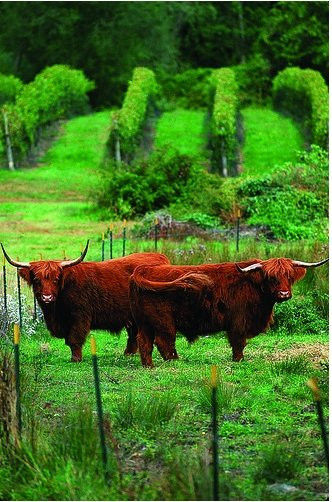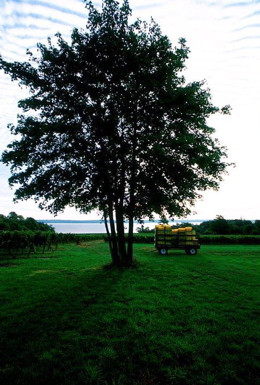Trender: Vintner Nancy Parker Wilson
Thursday, August 04, 2011
Who are the Rhode Islanders leading in arts, fashion, food, and style? They're Trenders, and GoLocalProv offers glimpses of the people you most want to know on the scene. Today, vintner Nancy Parker Wilson, who carries on her family's legacy in growing grapes and winemaking at Greenvale Vineyards in Portsmouth.
Born and raised: Born in NYC, raised in RI and Bernardsville, NJ
Graduated from: Wesleyan University
Currently lives in: Portsmouth, RI and Boston, MA
Age: 52 years old
How did you get your start as a vintner?
I became involved with grapes and wine when my parents, Cortlandt and Nancy Parker started to grow grapes for Sakonnet Vineyards in 1982 on Greenvale Farm (and Vineyards) which my father’s great great uncle built in 1863. About 5 years into grape production, we had 14 acres planted and it became clear to my father that this was a multi-generational business. He asked me to help him take it to the next phase which was the wine production and of course selling, etc. Now we have about 20 acres of grapes and produce about 3,500 cases of wine. And of course we have a busy tasting room here at Greenvale, which is our stable that my architect husband William Wilson converted into a wonderful place for people to visit, taste wine, listen to music and buy wine.
Rhode Island has a very active Division of Agriculture which is extremely helpful as a farmer. There are many people in the state in both Department of Environmental Management and the Economic Development Office that want to see small businesses like ours thrive. In a state where farmland is the most expensive in the country, there is a real effort to protect what farmland there is left. From town to town, there are growing pains. The towns' governments are trying to manage them but in some cases the community has become divided because of short sighted behavior. Fortunately the state’s Agricultural Division recognizes that farming is a statewide issue and not town by town. Farming and open space keep a town viable.
How did you come to start Greenvale Vineyards?
My father, mother and uncle saw the writing on the wall about the future of farming in Portsmouth. They saw beautiful farmland become residential developments. Greenvale is on the State and National Registers of Historic Places and in order to protect it my parents started the vineyards. In the 70’s my parents had tried truck farming but on our size farm it was too expensive for too little return. Of course, this was before the very active farmers’ markets took shape in the state.
What criteria do you use for selecting grapes for your vineyard?
The criteria we use for picking grape varietals to plant has varied over the thirty years that we have been growing grapes. Actually my father planted Marechal Foche in the 1960’s and those plants are still going great guns! In general you want to plant grapes that are cool climate friendly like Chardonnay, Pinot Gris and Cabernet Franc. In 1983 we only had four choices of Chardonnay clones, these days there are hundreds of choices. So much research has gone into grapes. You can specify your weather characteristics as well as flavor characteristics. Our approach continues to be keep it simple. The hybrids that we first planted for Sakonnet Vineyards continue to be the most popular of our wines though. The hybrids are Vidal Blanc and Cayuga, which is the primary grape in our Skipping Stone.
What are the highlights of your production?
Certainly the highlight of our production is harvest. We will pick an average of 65 tons of fruit every fall. We have started as early as September 15 and finished as late as November 12. Usually it is 15 days over the two month period. There are many challenges. The fine line between ripe and overripe fruit, last hurricanes, early frost, finding the pickers. Very exciting and usually very satisfying. GET THE LATEST BREAKING NEWS HERE -- SIGN UP FOR GOLOCAL FREE DAILY EBLAST
Our winemaker Richard Carmichael says that along with harvest, a highlight for him is making the red. The reds are produced slightly differently. Rather than being placed in tanks and barrels where you don’t actually see the fermentation process, the reds are fermented in one-ton bins. Three times a day over a ten day period you have to “punch down” the skins that have floated to the top to extract the color and the flavors from the skin. The skins are almost clear by the time the fermentation process is complete and the wine is then transferred to barrels. Richard describes making the red wine as a “lot more visceral” than making the white wine.
What are your personal favorite wines?
My personal favorites change with the weather, what we are doing, the food. Each wine of course has its own characteristics. I know each of them really well. When speaking with other people, we help them decide what wine they want by hearing what wines they like to drink.
What are your goals for Greenvale?
Our goals for Greenvale have been to make this truly beautiful place a viable operation to continue as a farm for generations to come. It certainly is getting harder as more land is consumed by houses. As our state’s Chief of Agriculture says “The last crop on farmland is houses.” Even though Rhode Island has the most expensive farmland in the country amazingly enough as businesses are shrinking, farms have increased by 42% in the last few years during this tough economic environment. That speaks well for Rhode Island, which has a forward-thinking right-to-farm act to promote direct sales to the consumer and allows farms to pursue other activities on the farm like music, special events, corn mazes etc. Long-time Rhode Islanders recognize that the culture of farming on this beautiful landscape is worth the huge effort it takes to protect these traditions.
What is the best thing about working in Rhode Island?
The best thing about working in Rhode Island is that it is small. You know who the government officials are and are able to access them. Amongst the other farmers there is a real camaraderie and amongst the other business professionals whether caterers or tractor repair shops, we all work together to do the best we can do. Newport County is incredibly vibrant and those of us who live and work here really benefit from that vibrancy.
What's the biggest challenge working in Rhode Island?
The biggest challenge in Rhode Island is probably the same in every state. There is just an immense amount of paperwork that a small business needs to handle almost daily. Everybody is working hard to try to attract business and help Rhode Island’s economic vitality, but we do not benefit from economy of scale. But again, because it is small you tend to be working with the best of the best.
Nancy Parker Wilson says "our operation thrives on people coming to visit." Greenvale is open daily, and features live jazz from 1-4 pm every Saturday through November. www.greenvale.com
Related Articles
- Trender: newportFILM Founder Andrea van Beuren
- Trender: Social Media Guru Kevin DeSoto
- Trender: Jeweler Patrick McMillan
- Trender: Arts Entrepreneur Reza Clifton
- Trender: Painter Pete Hocking
- Summer Wine Getaway to Greenvale Vineyards




